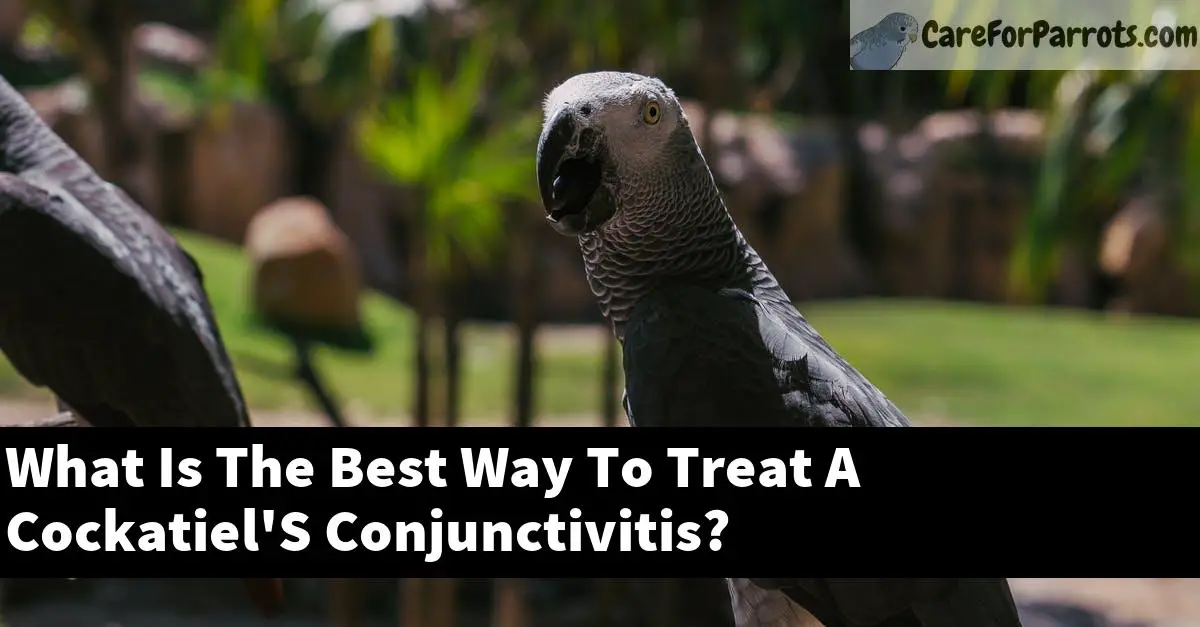As a loving and responsible pet owner, it’s essential to know how to properly care for your cockatiel, especially when it comes to health issues like conjunctivitis.
This article will walk you through some of the most effective ways to treat and manage this common eye infection in cockatiels. We’ll dive deep into the symptoms, causes, and treatment options to help you ensure your feathered friend’s well-being.
If you’ve ever noticed your cockatiel’s eyes looking red and swollen, there’s a good chance it’s suffering from conjunctivitis. While this condition can be uncomfortable and even painful for your bird, the good news is that it’s usually quite manageable with the right approach.
So, let’s take a closer look at the best ways to treat your cockatiel’s conjunctivitis and get them back to their happy, healthy selves.
Table of Contents
Identifying Conjunctivitis in Cockatiels
Symptoms of Conjunctivitis
To effectively treat conjunctivitis, it’s important to first recognize the signs and symptoms in your cockatiel. These may include:
- Red, swollen, or watery eyes
- Discharge from the eyes
- Frequent blinking or eye rubbing
- Sensitivity to light
- General discomfort or irritability
Causes of Conjunctivitis
There are several factors that can contribute to your cockatiel developing conjunctivitis, such as:
- Bacterial or viral infections
- Allergies
- Environmental irritants (dust, smoke, etc.)
- Injury or trauma to the eye
- Underlying health issues
Seeking Professional Help
Consulting a Veterinarian
When you notice signs of conjunctivitis in your cockatiel, it’s crucial to consult with an avian veterinarian as soon as possible. They can accurately diagnose the issue, identify the underlying cause, and prescribe the appropriate course of treatment.
Diagnostic Tests
To determine the cause of your cockatiel’s conjunctivitis, your veterinarian may perform several diagnostic tests, including:
- A physical examination
- Swabbing the eye for laboratory testing
- Blood tests to check for underlying health issues
Treatment Options for Conjunctivitis
Topical Medications
Your veterinarian may prescribe topical medications, such as antibiotics or anti-inflammatory eye drops, to help alleviate your cockatiel’s symptoms and treat the underlying infection.
Oral Medications
In some cases, oral medications like antibiotics or antiviral drugs may be necessary to effectively treat the underlying cause of your cockatiel’s conjunctivitis.
Environmental Modifications
Making changes to your cockatiel’s environment can help alleviate their symptoms and prevent future occurrences of conjunctivitis. This may include:
- Regularly cleaning their cage
- Providing a dust-free environment
- Using an air purifier to remove irritants
Supportive Care
While your cockatiel is recovering, it’s important to provide supportive care to ensure their overall well-being. This can include:
- Keeping them warm and comfortable
- Providing clean water and a nutritious diet
- Monitoring their overall health and behavior
Preventing Conjunctivitis in Cockatiels
Routine Health Checks
Regular check-ups with an avian veterinarian can help identify and address potential health issues before they become more severe.
Proper Hygiene
Maintaining a clean living environment for your cockatiel can help prevent the spread of infections and reduce their exposure to irritants.
Monitoring for Signs of Illness
Keeping an eye on your cockatiel’s behavior and overall health can help you identify any signs of illness, such as conjunctivitis, early on. This allows you to seek treatment sooner and improve your bird’s chances of a full recovery.
Conclusion
Caring for a cockatiel with conjunctivitis may seem daunting at first, but with the right knowledge and approach, it’s a manageable condition. By recognizing the symptoms, consulting with an avian veterinarian, and providing the appropriate treatment and supportive care, you can help your feathered friend overcome this eye infection and maintain their overall health and well-being.
FAQ
1. How long does it take for a cockatiel to recover from conjunctivitis?
Recovery time can vary depending on the severity of the infection and the underlying cause. With proper treatment and care, most cockatiels start to show improvement within a few days and fully recover within 1-2 weeks.
2. Can conjunctivitis in cockatiels spread to other birds or humans?
While some types of conjunctivitis, such as those caused by bacterial or viral infections, can be contagious to other birds, it is less common for them to spread to humans. To minimize the risk of transmission, practice good hygiene and quarantine any affected birds from the rest of the flock.
3. What should I avoid using to clean my cockatiel’s eyes when they have conjunctivitis?
Avoid using harsh chemicals, alcohol-based products, or anything that could cause further irritation to your cockatiel’s eyes. Instead, use a warm, damp cloth or cotton ball to gently clean the area around their eyes.
4. Can I use over-the-counter eye drops for my cockatiel’s conjunctivitis?
You should always consult with an avian veterinarian before using any over-the-counter medications on your cockatiel. Some products may not be safe or effective for birds and could cause more harm than good.
5. Is there a way to prevent my cockatiel from developing conjunctivitis in the future?
While it’s impossible to guarantee that your cockatiel will never develop conjunctivitis again, there are steps you can take to minimize the risk. This includes maintaining a clean living environment, providing proper nutrition, and scheduling regular check-ups with an avian veterinarian.






